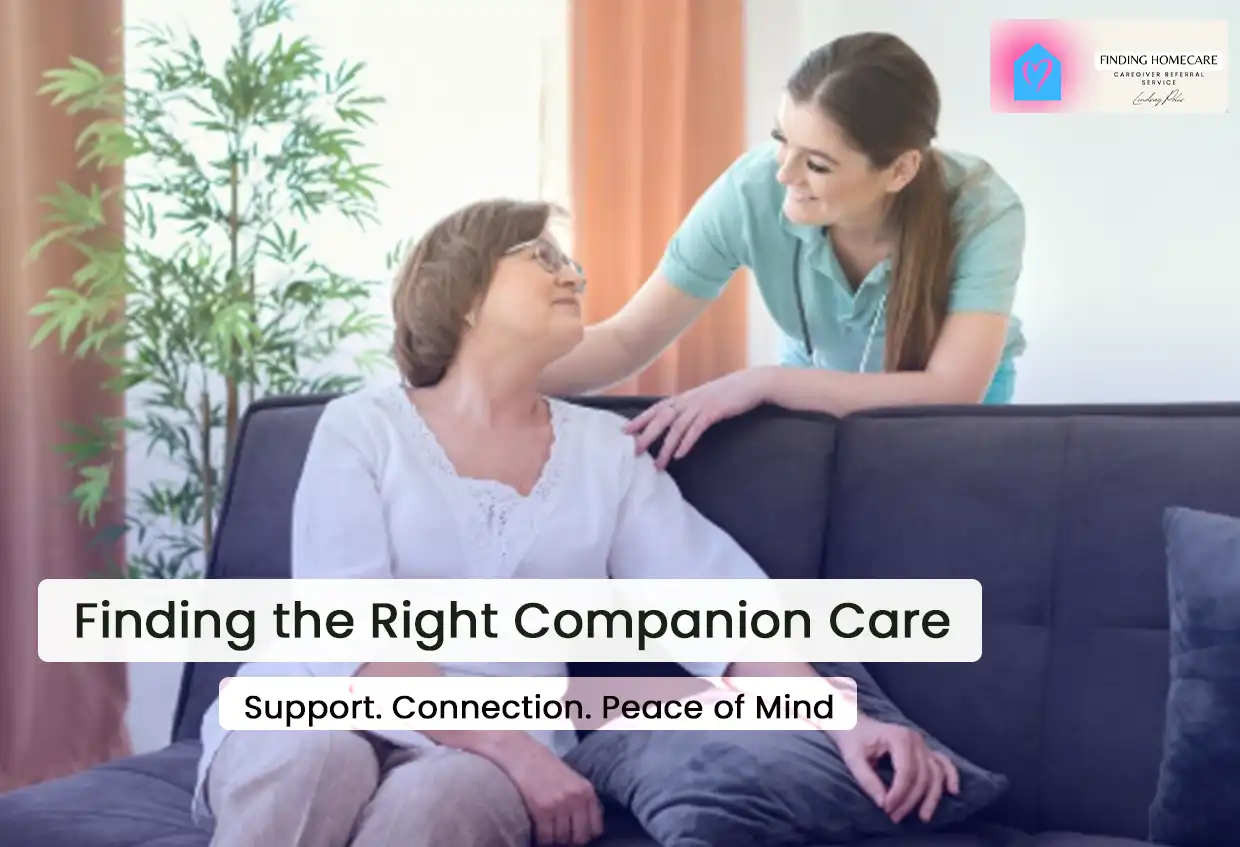Looking for the best companion care service for your family? Then you have come to the right place. Home care services are widely available in California, but finding a good provider can be difficult. We’ve created this comprehensive guide to help you connect with the best companion care provider.
Here we will teach you step by step the points that will help you make the right decision. Quality care is available in small towns from San Diego, Los Angeles, Sacramento — you just have to know what to look for.
Understand What Companion Care Is and Why It Matters
If you are looking for companion care for the first time, first understand what it really is. Companion care generally refers to services where a caregiver stays with a member of your family, looking after them and making their daily life easier.
It is complementary to medical care, but not medical care. For example, a caregiver can feed your family member, walk them, talk to them, take them to the market, but usually it is not their responsibility to administer medicine or perform medical procedures.
- To learn more, read our in-depth article on What Is Companion Care for the Elderly.
Who is companion care for?
Companion care is very useful for the elderly, patients during post-surgery recovery, and those experiencing loneliness or stress. This service is available in many California cities, but finding the right provider is important.
For example, many households in San Diego are where seniors live alone. Caregiver is a supportive presence for them.
How does companion care work?
A caregiver usually comes to the client’s home every day or at certain times and helps them. If someone wants 24/7 care, live-in caregivers are also available. It is available in many areas of California, such as Los Angeles, Fresno, San Jose, Oakland, and of course San Diego.
Some common features of Companion Care are:
| Service | Description |
| keep company | To reduce loneliness |
| prepare food | With healthy food |
| go to the market | Meet daily needs |
| take a walk | To maintain physical activity |
| Regular communication | Update with family |
Assess Your Loved One’s Specific Needs
When you’re looking for companion care, first understand what kind of help your family member needs. Some may just want companionship, while others may want help with daily tasks.
This step is very important because choosing a wrong service will not make your family members comfortable. So whether you live in San Diego, Chula Vista, La Jolla or any other city, a good care plan should be tailored to their needs.
- If your family member needs dementia support, check out our Dementia Care San Diego page.
Need help with any tasks in daily life?
If someone cannot feed, dress, or bathe themselves, they need ADL (Activities of Daily Living) support. This can be a part of companion care, but not all caregivers can do it.
Need emotional and social support?
Many older people suffer from loneliness. In such cases, the caregiver can keep them company, talk, play games, or even take them out for a walk.
What checklist to use?
Ask yourself:
- Can he eat himself?
- Can he dress himself?
- Can he walk alone?
- Can he bathe independently?
- Does he take medicine on time?
- Is he mentally stable?
If the answer is “no” to most of these questions, your family member needs companion care plus some extra help.
Create a checklist for yourself:
| Need | Yes / No |
| feeding | ☐ |
| put on clothes | ☐ |
| take a bath | ☐ |
| Walking aid | ☐ |
| Medication monitoring | ☐ |
| social contact | ☐ |
Check Licensing, Certifications & Agency Reputation
When you are looking for companion care services, first find out if the provider is licensed and certified in California. Many times, unlicensed agencies may mislead customers with wrong information.
Also, it is very important to look at the reputation of the company. Go online to Google, Yelp or Facebook to read what opinions are about the company. Local reviews are very helpful, especially if you live in San Diego, Chula Vista, Carlsbad or another California city.
How to Check Companion Care Agency License in California?
You can check if a home care agency is licensed by the California Department of Social Services. You can visit its official website. If you search by the name of the company, you will know whether they are licensed.
Is quality certification important?
Yes, if a companion care agency is certified by an organization like CHAP (Community Health Accreditation Partner) or The Joint Commission, it is proof of their quality and compliance.
How to see reviews and ratings?
You can learn a lot from Google Maps, Yelp and Facebook. There should be positive reviews and at least a 4.5/5 rating. Also, see if there are any negative comments and how the agency has responded to them.
| Checklist | Yes / No |
| Have a license | ☐ |
| CHAP or JCAHO certification | ☐ |
| Google review 4.5+ | ☐ |
| Positive customer feedback | ☐ |
Evaluate Caregiver Qualifications & Training
The success of a companion care service depends on the caregivers. So find out if the caregivers are trained, qualified and experienced.
Caregivers often lack formal training, which can be risky. Especially if you have a family member suffering from dementia, Alzheimer’s or medical issues.
What kind of training do caregivers need?
- CPR and First Aid
- Dementia Care
- Medication Reminders
- Personal Hygiene Assistance
- Communication Skills
Background check and drug screening
Background checks on anyone who comes into your home are extremely important. Must have no criminal record and clear drug test.
Language skills of California caregivers
Many elderly family members do not understand English well. So if someone in your family speaks Spanish, Mandarin, or another language, find a bilingual caregiver.
| Caregiver Verification | Yes / No |
| Training completed | ☐ |
| Background check | ☐ |
| Drug screening | ☐ |
| Bilingual skills | ☐ |
Look for Personalized Care Plans & Flexibility
Companion care is not one-size-fits-all — every family’s needs are different. So find an agency that can create a customized care plan based on your family’s needs.
Also, demand may change over time. So get services that can flexibly adapt to those changes.
How is a customized care plan created?
To develop a good care plan, the care manager first understands your needs by talking to you. Then make a plan accordingly.
Why is flexibility important?
If you first thought your family member just wanted companionship, but later found he needed medication monitoring, an agency that can respond to that change is very helpful.
Some popular care options in California include:
| Option | Description |
| Part-time Care | 4–6 hours a day |
| Full-time Care | 8–12 hours |
| Live-in Care | 24/7 care |
| Respite Care | For family vacations |
Explore our flexible service offerings at Care Management and Advocacy.
Check Communication, Transparency & Matching Process
It is very important that the caregiver you hire matches your family member. So look for agencies that focus on caregiver matching.
Also, see to it that the agency maintains regular contact with family members.
How is caregiver matching done?
Good agencies profile caregivers, offer opportunities to speak with them, and keep the matching process completely transparent.
How important is communication?
Good communication is essential for regular updates, care plan changes, and reporting any issues.
How to make a complaint?
Check out the easy way to report a problem. No good agency ignores complaints.
| Checklist | Yes / No |
| Caregiver Matching Process | ☐ |
| Regular updates | ☐ |
| Grievance procedure | ☐ |
Understand Costs, Payment Options & Financial Assistance
Check if the cost of companion care will fit into your budget. Average cost in California is $20 to $35 an hour. But that depends on what city you live in, the experience of the caregiver, and the type of service.
Also, there are some government programs that you can get financial help from.
Average Cost of Companion Care in California:
| City | Hourly cost |
| San Diego | $25 – $32 |
| Los Angeles | $26 – $35 |
| Sacramento | $22 – $30 |
| Fresno | $20 – $28 |
What are the payment options?
- Private Pay (Cash)
- Medicaid
- CDPAP (Consumer Directed Personal Assistant Program)
- IHSS (In-Home Supportive Services)
Some financial aid programs in California include:
| program | description |
| Medicaid | Care services under Medicaid |
| CDPAP | The patient can appoint a caregiver himself |
| IHSS | Government programs for home help |
Interview Agencies & Meet Potential Caregivers
First, do an interview with the agency or caregiver you hire. You will get to know them better.
Also, if possible, interview your family member with them.
What questions to ask the agency?
- What are the qualifications of caregivers?
- How is caregiver matching done?
- How is a care plan created?
- How are complaints resolved?
What questions to ask caregivers?
- How many years have you been working?
- Do you have dementia or Alzheimer’s care?
- Have you ever worked in home care?
How is the use of caregivers?
Talk to them and see what kind of people they are. Are they sympathetic? What kind of language do you use? Is your family member comfortable with them?
FAQ about Choose the Best Companion Care Services
How to choose the right elder care provider in California?
Understand your family man’s needs, check licenses and reviews, vet caregivers, and take a trial visit first.
How much does a family member get paid to be a caregiver in California?
Through the CDPAP or IHSS program, you can hire a family member as a caregiver and be paid $1500–$3000 per month.
What not to say to caregivers?
Caregivers should not use disrespectful or insulting language. Appreciate and respect their work.
How to choose the best home care agency in California?
Check licenses, reviews, caregiver training, and customized plans. Talk to few agencies and then decide.
Ready to Find the Right Companion Care Provider?
With Finding Home Care, you will find all types of companion care referral services in California. Contact us and find the best caregiver for your family member.
Call us at +619-784-6691
Serving San Diego, Chula Vista, La Jolla, Carlsbad and more
Schedule your FREE consultation today!


